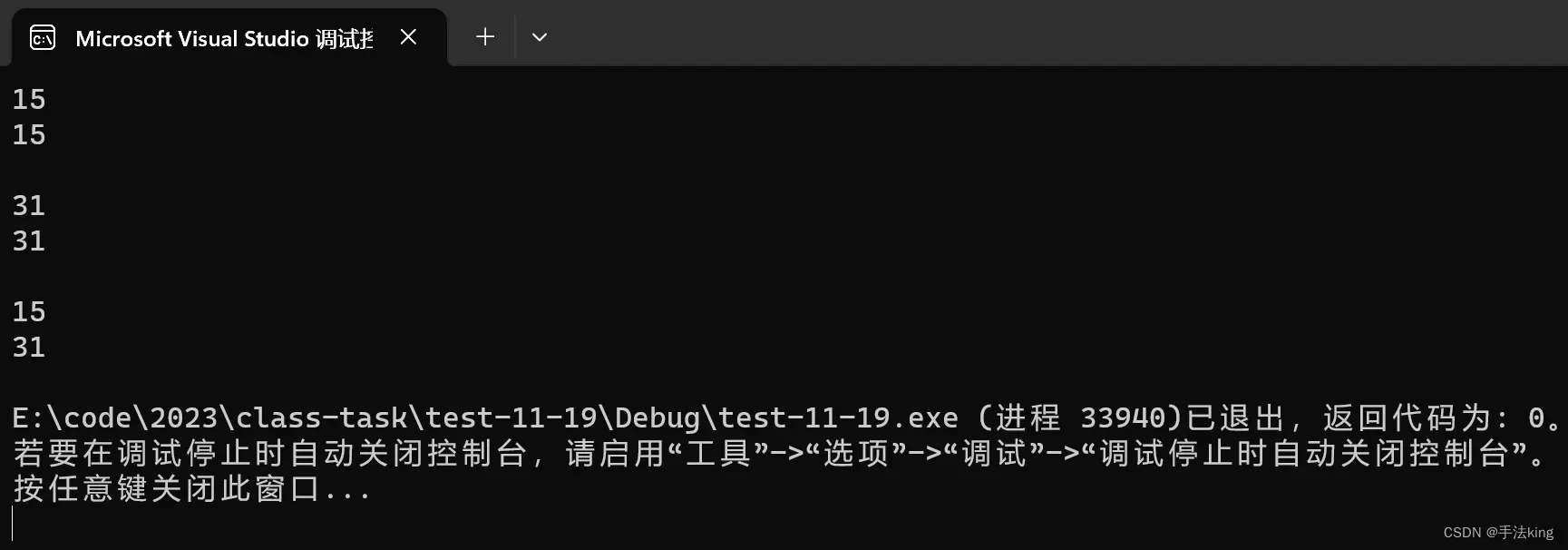目录

1,rbegin 和 rend
具体详情:cplusplus.com/reference/string/string/rbegin/

#include<iostream>
#include<string>
using namespace std;
int main()
{
string s1("hello world");
string::reverse_iterator it = s1.rbegin();
while (it != s1.rend())
{
cout << *it << " ";
it++;
}
return 0;
}
其实也就是逆置打印字符串;
而且缺点也很明显,类型太长了不便于书写;
所以 auto 的好用之处就体现出来了,自动帮我们推算类型;
int main()
{
string s1("hello world");
//string::reverse_iterator it = s1.rbegin();
auto it = s1.rbegin();
while (it != s1.rend())
{
cout << *it << " ";
it++;
}
return 0;
}
这样就更 OK 了;
还有一个冷门不常用的,就是 crengin 代替 rengin ,crend 代替 crend ;
int main()
{
string s1("hello world");
//string::reverse_iterator it = s1.crbegin();
auto it = s1.crbegin();
while (it != s1.crend())
{
cout << *it << " ";
it++;
}
return 0;
}
2,reserve & capacity
reserve:更改容量,需要多少空间,提前开好即可
capacity:返回空间总大小


int main()
{
string s1;
string s2("hello world");
//初始容量大小
cout << s1.capacity() << endl;
cout << s2.capacity() << endl;
cout << endl;
s1.reserve(20);
s2.reserve(30);
//当 n>容量大小
cout << s1.capacity() << endl;
cout << s2.capacity() << endl;
cout << endl;
s1.reserve(5);
s2.reserve(5);
//当 n<容量大小
cout << s1.capacity() << endl;
cout << s2.capacity() << endl;
return 0;
}
小伙伴们会好奇,为什么扩容的容量不跟我们指定的容量相同;
那是因为编译器有自己的一套扩容机制;
int main()
{
string s1;
string s2("hello world");
int doll = s1.capacity();
cout << s1.capacity() << endl;
int i = 1000;
while (i--)
{
s1 += ' ';
if (doll != s1.capacity())
{
cout << s1.capacity() << endl;
doll = s1.capacity();
}
}
return 0;
}
基本上是按 1.5 倍扩增的,除了刚开始的;
所以空间容量只会在这些值里面,就算是 16 也直接扩容至下一阶段 31,其实是 32,因为还有一个 ‘ \0 ‘ ;
当扩容之后的量大于当前的容量则扩大;
当扩容之后的量小于当前真实容量则不变,否则缩小;
string s2(“hello world”) 里面的 ” hello world ” 真实容量就是11;
3,max_size ( )
算出字符串所能开辟的最大空间
int main()
{
string s1;
string s2("hello world");
cout << s1.max_size() << endl;
cout << s2.max_size() << endl;
return 0;
}
由上可得 string类所能开辟的最大空间都是一样的;
但是所能开辟的最大空间并不是真的能开辟,我们来看一段代码;
int main()
{
string s1;
string s2("hello world");
cout << s2.capacity() << endl;
cout << s2.max_size() << endl;
s2.reserve(s2.max_size());
cout << s2.capacity() << endl;
return 0;
}
上面开最大空间的容量的时候,运行直接崩溃的,根本开不出来;
真实的话是开不出来的,这仅供参考,不必当真;
4,size()& resize
size():返回字符串有效长度
resize():将有效字符的个数该成n个,多出的空间用字符 c 填充


我们直接来看一段代码
int main()
{
string s1;
string s2("hello world");
//打印有效字符长度和容量大小
cout << s1.size() << " " << s1.capacity() << endl;
cout << s2.size() << " " << s2.capacity() << endl;
cout << endl;
s1.resize(20);
s2.resize(30);
//有效字符对容量的影响
cout << s1.size() << " " << s1.capacity() << endl;
cout << s2.size() << " " << s2.capacity() << endl;
cout << endl;
s1.resize(5);
s2.resize(8);
//
cout << s1.size() << " " << s1.capacity() << endl;
cout << s2.size() << " " << s2.capacity() << endl;
cout << endl;
s1.reserve(100);
s2.reserve(200);
//容量对有效字符的影响
cout << s1.size() << " " << s1.capacity() << endl;
cout << s2.size() << " " << s2.capacity() << endl;
return 0;
}
由上可得,有效字符 size 的长度会影响 capacity 容量,但是 capacity 容量的大小不会影响 有效字符 size ;
而且 字符串有效字符长度会随着 size 的变化而变化即使是缩小,但是容量不会改变,以后可以用于【删除数据,保留前 n 个】
1,void resize (size_t,char c)
扩增加尾插
int main()
{
string s1;
string s2("hello world");
s1.resize(10, 'y');
s2.resize(20,'x');
cout << s2 << endl;
cout<< s1 << endl;
return 0;
}

这个我们以后可以用作给字符串赋值和初始化;
5,push_back & append
push_back :在字符串后尾插字符c
append:在字符串后追加一个字符串


直接上代码:
int main()
{
string s1;
string s2("hello world");
s1.push_back('x');
s2.push_back('y');
cout << s1 << endl;
cout << s2 << endl;
cout << endl;
s2.append("hello world");
s2.append("hello wprld");
cout << s1 << endl;
cout << s2 << endl;
return 0;
}
1,追加字符串范围
string& append(inputiterator first,inputiterator last);
int main()
{
string s1("abcdefg");
string s2("hello world");
s1.append(s2.begin(), s2.end());
cout << s1 << endl;
cout << endl;
string s3("abcdefg");
s2.append(++s3.begin(), --s3.end());
cout << s2 << endl;
return 0;
}
直接范围也是可以的,还可以 ++,–;
int main()
{
string s1;
string s2("hello world");
s1.append(s2,2,7);
s2.append(10, 'x');
cout << s1 << endl;
cout << s2 << endl;
return 0;
} 指定也是可以的,用法有很多更 string类的用法类似,大家可以去查查文档的各种用法;
指定也是可以的,用法有很多更 string类的用法类似,大家可以去查查文档的各种用法;
2,直接追加
int main()
{
string s1;
string s2("hello world");
s1 += 'x';
s2 += " abcdefg";
cout << s1 << endl;
cout << s2 << endl;
return 0;
}
直接 追加也可以,更简便;

文章出处登录后可见!
